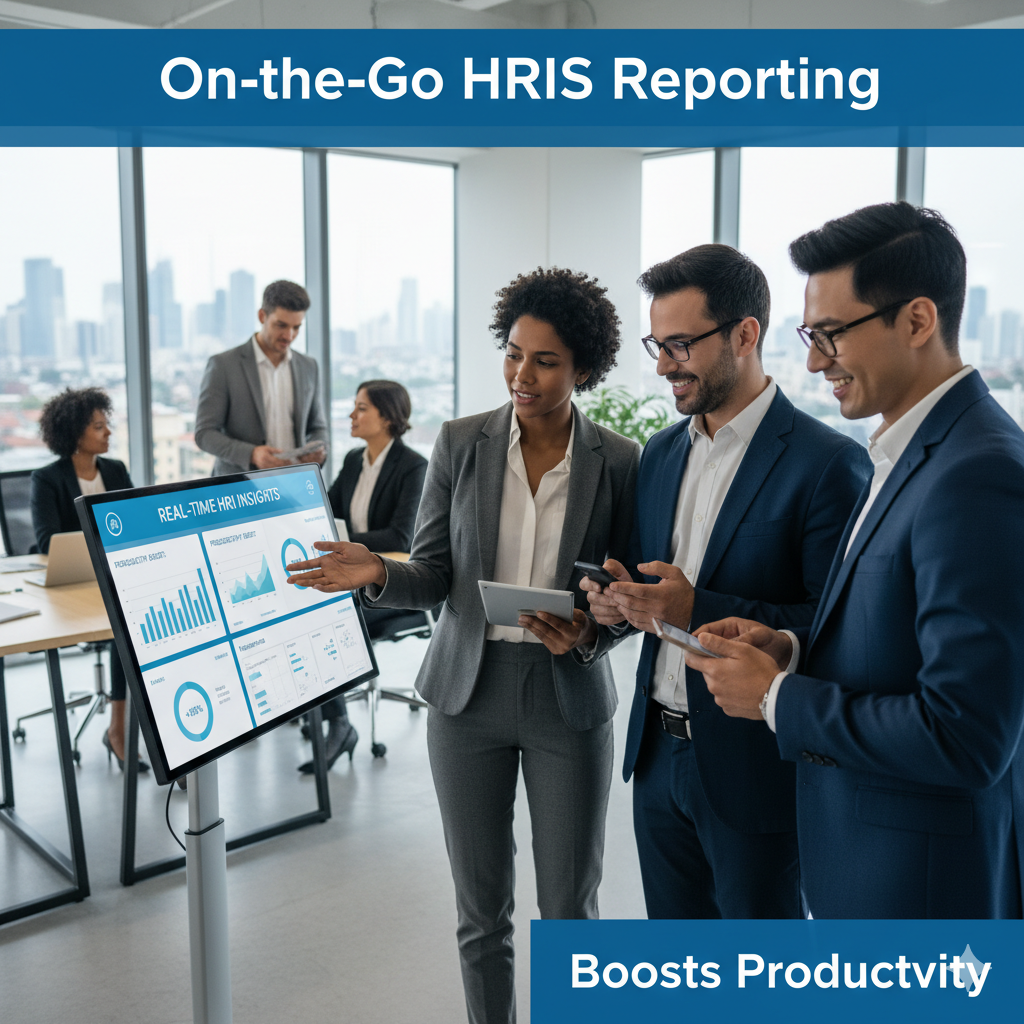In today’s fast-moving workplace, data-driven decision-making has become essential for every HR professional. Gone are the days when HR teams relied on static reports or had to wait days for updated employee data.
With real-time HRIS (Human Resource Information System) reporting, HR managers and executives can now access vital insights on the go — directly from their smartphones, tablets, or laptops. This mobility transforms how HR departments operate, enabling faster decisions, improved productivity, and a more agile workforce.
What Is “On-the-Go” HRIS Reporting?
On-the-go HRIS reporting refers to the ability to view, generate, and share HR reports in real-time from any device, anywhere.
An HRIS (Human Resource Information System) centralizes all employee data — from payroll and performance metrics to attendance and recruitment — and makes it accessible through a secure, cloud-based system.
When equipped with mobile access, HRIS platforms allow HR professionals to:
- Generate up-to-the-minute reports.
- Track key HR metrics in real time.
- Approve requests, manage leave, or view analytics instantly.
- Share reports with managers or executives remotely.
Simply put, it’s HR intelligence without the desk.
Why Real-Time HR Insights Matter
Traditional HR reporting often leads to delays and outdated data. But real-time insights bridge that gap by offering accurate, live data on workforce performance and operations.
Here’s why it matters:
- Instant Decision-Making
Managers can access live metrics such as turnover rates, attendance, or productivity trends — enabling faster responses to HR challenges. - Improved Accuracy
Real-time data minimizes errors caused by manual entries or outdated information. - Enhanced Employee Experience
Quick responses to requests, transparent communication, and better workforce management improve overall employee satisfaction. - Increased Agility
Businesses can adapt swiftly to changing HR trends, whether it’s managing remote employees or planning new hires.
How On-the-Go HRIS Reporting Boosts Productivity
- Faster Decision-Making Anywhere
With mobile HRIS dashboards, HR leaders no longer need to wait until they’re in the office. Whether attending an off-site meeting or working remotely, they can approve requests, view analytics, and make quick, informed decisions.
- Reduced Administrative Bottlenecks
HR professionals can handle time-off approvals, payroll reviews, and compliance tracking directly from their mobile devices — cutting down repetitive administrative tasks.
- Enhanced Collaboration
On-the-go reporting promotes seamless communication between departments. HR managers can share reports instantly with finance, operations, or leadership teams, improving alignment across the organization.
- Empowered Employees
Mobile HR tools give employees direct access to view payslips, update details, or submit requests — freeing up HR teams for strategic initiatives.
- Data-Driven HR Strategy
By having access to real-time KPIs (Key Performance Indicators), HR leaders can spot trends early — like rising absenteeism or turnover — and act before they escalate.
The Role of Cloud Technology in HRIS Mobility
Modern HRIS solutions leverage cloud-based infrastructure, ensuring secure and scalable access to HR data.
Benefits of cloud-powered HRIS systems include:
- 24/7 access to data from any location.
- Automatic updates and real-time synchronization.
- Enhanced data security with multi-factor authentication.
- Scalability for growing organizations.
Cloud technology is the foundation that makes on-the-go HRIS reporting possible — ensuring speed, reliability, and compliance across global teams.
Data Security: A Non-Negotiable Priority
While mobility offers freedom, data security remains a top concern.
Leading HRIS solutions include:
- End-to-end encryption to protect sensitive employee data.
- Role-based access control to ensure only authorized users can view or modify information.
- Regular compliance updates to align with labor and privacy laws such as GDPR or HIPAA.
Real-World Example: HR Productivity in Action
Consider an HR manager overseeing multiple regional offices.
Without on-the-go access, approving leave requests, checking attendance, or reviewing performance data would take hours — if not days.
With mobile HRIS reporting:
- They approve tasks in minutes.
- View real-time dashboards.
- Share reports instantly with management.
Result? Time savings, better decisions, and a more productive HR department.
Future of HRIS: The Mobile-First Mindset
The next generation of HRIS tools will be AI-driven, predictive, and fully mobile. Expect systems that automatically:
- Recommend data-driven actions.
- Alert managers about emerging HR trends.
- Offer voice-command analytics for faster insights.
The future of HR isn’t just digital — it’s mobile, intelligent, and always connected.
Conclusion
- Real-time, on-the-go HRIS reporting is no longer a luxury — it’s a necessity for modern HR teams.
- By combining instant insights, mobile flexibility, and data-driven decision-making, organizations can significantly boost HR efficiency and overall productivity.
If your HR team still relies on static reports, it’s time to embrace the power of mobility — because in today’s workplace, HR success travels with you.

